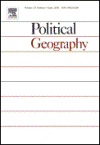The period since the end of the Cold War has presided over a dramatic expansion in the number of multilateral peacekeeping operations (PKOs). Yet individual states have varied significantly in their enthusiasm for peacekeeping and, moreover, demonstrated a greater propensity to participate in operations located in certain countries than others. Our contribution in the present paper is to provide new insights into how geography underpins these spatial variations. Uniquely, we make use of a geographically disaggregated dataset of multilateral PKOs, which allows us to capture various dyadic linkages between sending and receiving countries. Our results confirm previous work indicating that more democratic countries are more likely to participate in PKOs, but extend these findings by showing that countries' commitment to human rights has a similar positive influence. We also show that aspects of spatial proximity (physical distance, same region) and relational proximity (colonial ties) between potential sending and receiving states raise the likelihood of participation. Yet we find that two relational variables widely discussed in the literature as possible correlates of peaceful interactions – bilateral trade and joint membership of intergovernmental organisations (IGOs) – have no statistically discernable influence on countries' involvement in particular PKOs.
Perkins, Richard & Eric Neumayer (2008) Extra-territorial Interventions in Conflict Spaces: Explaining the Geographies of Post-Cold War Peacekeeping, Political Geography 27 (8): 895–914.







